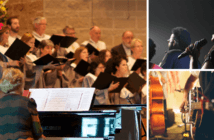A common phrase used in recent years to describe some people is “spiritual but not religious.” It sounds good and believable given our modern individualistic tendencies and self focus. In a sense, it was a bit comforting to think that those who no longer attend church or practice their religion publicly are still personally spiritual and attuned to the things of God. The story line became that religion was in decline while spirituality was increasing.
Well, it turns out that this new “spiritual but not religious” category may be a bit too clever to survive investigation. Nancy T. Ammerman, the highly regarded sociologist of religion, has completed a major research project focused on a cross section of the U.S. population that matches the religious make up of the nation. Using in-depth interviews over a period of time, the project sought to understand the spiritual lives of people through the stories they tell about their everyday lives.
It turns out that this new “spiritual but not religious” category may be a bit too clever to survive investigation.
It turns out that this divide between personal spirituality and organized religious expression does not exist in the findings. She found that those most committed to spiritual practices and a spiritual view of the world were the most active in organized religion and vice versa. Increased spiritual sensitivity led to greater engagement in organized religious communities as declining spiritual interest led to less participation.
One of the most revealing comments by Ammerman is, “What we also discovered … was that the people who claim there is an opposition between being spiritual and being religious are, for the most part, themselves neither.” She goes on to suggest that efforts to draw lines between individual and communal spirituality and religion are misleading and to be avoided (289).
This does not alter the reality that within congregations a relatively small percent are actively engaged at levels consistent with high spiritual commitment. However, it is not reasonable to expect higher levels of participation without enhanced spiritual sensitivities in the lives of the less active. Greater spiritual awareness leads to more participation, and the participation itself stirs heightened spiritual awareness.
This virtuous circle can produce vitality for congregations, but the focus needs to remain on helping people connect faith and life. Churches make a mistake if they confuse spiritual interest with church loyalty or obligation. Rather, for most today their connections to a church are tied more to the extent to which the congregation sustains them spiritually and gives them an opportunity to serve Christ and others.
This research is published in Sacred Stories, Spiritual Tribes: Finding Religion in Everyday Life by Nancy Tatom Ammerman (New York: Oxford University Press, 2014) available through Cokesbury or Amazon.
Related Resources:
- The “Nones” and the Spirituality of Everyday Living by Keith Anderson
- Fostering Conversations That Connect by Lovett H. Weems, Jr.
- Where do People Find Meaning Today? by Dwight Zscheile
- 50 Ways to Increase Active Engagement






